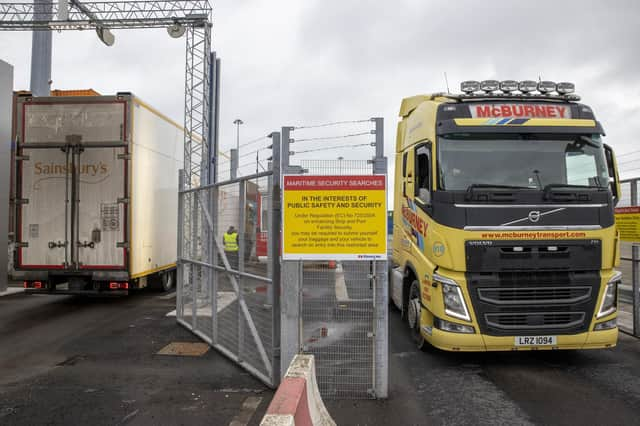Windsor Framework: Theresa Villiers says NI's EU regulation problem won't be fixed by extending it to Great Britain


Tory Brexiteers are furious at speculation the UK government might agree to ensure new British regulations don’t create added barriers to trade with Northern Ireland, as part of a deal with the DUP.
Northern Ireland is currently tied to EU regulations on goods while Great Britain is not – the root of trade friction and the Irish Sea border.
Advertisement
Hide AdAdvertisement
Hide AdThe Daily Telegraph has reported that as part of a deal with the DUP, the government is promising that all legislation would have to be accompanied by a ministerial statement confirming it did not have a “significant adverse effect” on internal UK trade.
Mrs Villiers told the News Letter: “We are not going to fix the problem of lack of democratic control over regulatory rules in Northern Ireland by extending that problem to cover the whole UK.
"That was what the rejected May deal sought to do. What we need is for the EU to wake up to the damage that their inflexible approach is doing to political stability in Northern Ireland.
"Ideological single market dogma from the Commission is getting in the way of finding a pragmatic solution to address unionist concerns”, she said.
Advertisement
Hide AdAdvertisement
Hide AdKemi Badenoch, the UK business secretary, has also opposed the idea that Great Britain would stay close to the EU regulations applicable in Northern Ireland – saying there would be “no point” in such an approach.
Ms Badenoch said: “I can’t, of course, comment on the Northern Ireland political process which is ongoing, and which I am not a participant to. However, what I will say is that we retain the ability to diverge. That is clear. And I do agree with her that if we are really to seize the benefits of Brexit we need to find that comparative advantage in our regulations with the EU, otherwise there would be no point.”
She pointed to her own record on the issue of EU regulation, adding: “I do understand her concerns, I will speak to colleagues across departments and make sure they are raised at the highest level.”
The Irish Sea border exists because Northern Ireland is in a different regulatory system for goods to Great Britain. The rumoured offer from the government would not change that.
Advertisement
Hide AdAdvertisement
Hide AdHowever, it could lessen the practical impact and the need for more checks on goods travelling within the UK in future.
It could also mean that Great Britain is limited in the nature of the international trade deals it signs.
Tory MP Sir Jacob Rees-Mogg, a former business secretary and arch Brexiteer, said: “This means we will not diverge at all, and we will have ended up with Theresa May’s Chequers deal in all but name.
“I voted against the Windsor Framework because it subordinates part of the UK to the EU. This mechanism would restore part of the EU hegemony over us.”
Advertisement
Hide AdAdvertisement
Hide AdSir Iain Duncan Smith said that the plan was “a real problem” – and that the Windsor deal “is the back door to the EU holding on to the UK and stopping us diverging. It should be replaced.”
TUV leader Jim Allister said: "The Daily Telegraph story applies only to laws over which the UK has retained control, not the laws it has surrendered to the EU. You are therefore only talking about future British legislation which would apparently guarantee no divergence. This would leave untouched the huge bank of EU laws which already apply to Northern Ireland of which there are hundreds in Annex 2 of the Protocol and the evolution and expansion of those. Control of that whole aspect of our goods economy has been surrendered to the EU. The UK Parliament is now in a position where it cannot change any of those. All it can change is its own laws.
"The story illustrates the folly of the surrender of sovereignty which the Protocol involved. Importantly, for Brexiteers in GB it would make a nonsense of Brexit as the whole of the UK would be tied to things and institutions which they thought they had left”.
Comment Guidelines
National World encourages reader discussion on our stories. User feedback, insights and back-and-forth exchanges add a rich layer of context to reporting. Please review our Community Guidelines before commenting.